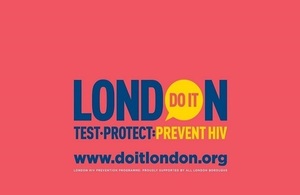The London HIV Prevention programme
The joint commissioning of HIV prevention services by all of the 33 London councils.

The Do It London logo
What was involved
By the end of 2013, Londoners accounted for over one third of those with new HIV diagnoses in the UK. 33,863 Londoners were living with diagnosed HIV and 32 of the 33 London boroughs were deemed to have a high prevalence of HIV against the national standard (2 people per 1,000 aged 15 to 59).
The London HIV Prevention Programme (LHPP) was established in 2013 by the London directors of public health, following a London-wide needs assessment. London Councils, the cross-party umbrella organisation for London’s 32 local authorities, and the City of London played an important role in ensuring the programme was not ‘lost’ at the time of transition of a range of public health responsibilities from the NHS to local authorities.
The main risk groups for HIV in London are men who have sex with men (MSM) and black African heterosexuals. Over half a million black Africans live in London, representing 7% of the London population. HIV prevalence is higher in London than outside with 1 in 8 MSM living with HIV, compared to 1 in 26 outside London.
Council leaders agreed the new HIV prevention programme, for a minimum of 3 years to 2017, to:
- increase the frequency of HIV testing
- promote consistent condom use and
- promote the adoption of safer sexual behaviours
Existing contracts were re-specified and subsequently re-tendered.
Condom distribution and personal or digital outreach to MSM
A new contract worth £950,000 over 2 years started on 1 April 2015. It delivers 1.5 million condoms and lubricant sachets to a minimum of 80 MSM venues across London and during large events (including London Pride, Summer Rites and London Fetish Week) as well as 76,000 face to face outreach contacts and over 100,000 online (Grindr-reach) contacts per year. This work is undertaken by the GMI partnership (a partnership of 3 charities: Metro, Positive East and Spectra) and Freedoms shop.
There was found to be a lack of robust evidence about how to target condom distribution effectively to black African communities. A review of existing schemes was commissioned to inform the further development of this part of the programme, with recommendations made to local boroughs regarding provision of localised condom distribution schemes for BAME communities.
Communications and media
A £1.3 million 2 year contract has developed an entirely new campaigning tool on sexual health for London: Do It London. Since its launch in summer 2015, this has delivered 4 major multimedia campaigns across the capital, focusing on the promotion of testing and safer sex. More information is available at: doitlondon.org and follow the campaign on Twitter @doitldn.
What works well
Julie Billett, HIV Prevention Lead, Association of Directors of Public Health (ADPH) London said:
LHPP was a totemic programme for bringing the directors of public health together and a good example of PHE nationally bringing expertise to the table and working with us.
Major achievements were:
- using the support and infrastructure of London Councils to assess the situation and place the issue on the agenda of council leaders
- commissioning and undertaking a comprehensive needs assessment
- taking a decision about the programme and setting in place governance and management arrangements for its future
- delivering an integrated, centrally managed and high profile programme with reach into both the general London public and targeted at main at-risk communities
- establishing a recognised and highly-rated platform for sexual health promotion and HIV prevention for London using non-traditional channels, and using new methods of campaigning to raise public awareness
- ongoing evaluation reveals that the campaign is continuing to raise awareness of HIV testing in the main groups with 68% of Londoners who had seen the Do it London campaign reporting it had influenced their behaviour towards HIV testing, whilst 66% of Londoners who had seen the Do it London campaign felt it had influenced their sexual behaviour, for example, to practise safe sex
Financial contributions to the new programme agreed within a memorandum of understanding, are pro-rata to each LA’s proportionate share of prevalent diagnosed HIV infections. This funding formula was perceived as equitable and was instrumental in securing the agreement of all local authorities to a new London-wide programme.
Next steps
As the programme continues to deliver, in its 18th month of new contracts, the case for collaboration across London has been demonstrated, especially in a complex area of public health such as HIV prevention. Local authorities receive major financial and public health benefits from working together, alongside stakeholders from London Councils, PHE, academic institutions and community groups.
The continued importance of epidemiological and behavioural expertise required both for sound evidence-based commissioning decisions and to support evaluation, makes the ‘whole system’ collaborative approach taken by LHPP an example of where working together delivers results for the frontline and communities of interest.
In collaborative work, no assumptions can be made about consensus and delivery – time and effort are required to develop it. This can be done by presenting clear evidence for proposed actions, demonstrating value for money and ensuring evaluation mechanisms are in place.
Further information
The London Borough of Lambeth commissions and manages the LHPP, including the large ‘Do It London’ campaign. Governance of the programme is overseen by a steering group, chaired by Julie Billett, Director of Public Health for Camden and Islington.
Queries about the programme should be addressed to Paul Steinberg, the Lead Commissioner at psteinberg@lambeth.gov.uk.